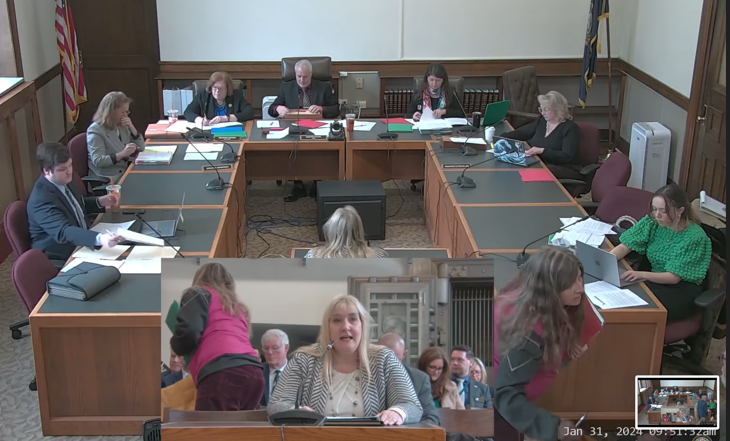By GARRY RAYNO, InDepthNH.org
CONCORD — Lowering the time needed to be eligible for state retirement system benefits will help attract and retain workers in today’s challenging workforce landscape, a Senate Committee was told Wednesday.
Senate Bill 309 would lower vesting rights to system benefits from 10 years to five and grew out of a commission that studied system benefits, particularly for Group 2 members, last summer and fall.
Commission member and the bill’s prime sponsor, Sen. Donna Soucy, D-Manchester, said lowering the time before a person is vested in the retirement system was approved unanimously by the commission.
“There was a great deal of discussion about the workforce shortage, and what drives the issue,” she told the Senate Executive Department and Administration Committee. “This change may help retain employees who may come into a job but a pension is too far off and they leave.”
She said the change from 10 years to five helps with workforce retention and possibly recruitment.
The change is not significant in dollars, Soucy said, but it is to employees.
There will be no impact during the current biennium, she said, because the contribution rates have already been set, the change will be going forward.
The proposed change was backed by a number of groups including firefighters, teachers and county officials.
They all said the change would make it easier to retain workers and not have to recruit and train new workers which is expensive.
Both Maine and Vermont retirement systems have five-year vesting periods while Massachusetts, Connecticut and Rhode Island have 10-year periods.
Nationally there are more than 100 public employee retirement systems and 60 have five-year vesting, and 25 have 10-year vesting, said Marty Karlon, Director of Communications and Legislative Affairs for the New Hampshire Retirement System.
He told the committee the change will increase the number of people who will be eligible for a pension, but the impact on the rates employees and employers pay is not significant.
He noted a teacher’s withholding would increase by .3 percent, while state employees would see a 1.7 percent increase.
The change is quite low because it will be spread out over a number of years, Karlon told the committee.
According to the bill’s fiscal note, the impact to the state would be $1.2 million annually beginning in fiscal year 2026, and $2.1 million annually for all employers.
Bob Fuller, study commission member representing the NEA-NH, told the committee the change will help to attract workers and to retain them.
He said there are a lot of older people entering teaching as a second career at 50 or 55 years of age and lowering the vesting period would be a great benefit for them.
They pay into the system and with five-year vesting, will be able to receive a benefit, he said.
These teachers are a great benefit to the state and to the kids, Fuller said, and it will bring the state in line with other states.
“The retirement system does a lot of good, but the fact of the matter, it could do a little bit better,” Fuller said. “This does not solve all the things but it is a good, prudent step forward to make the system better.”
John McAllister, the secretary-treasurer of the Professional Firefighters of New Hampshire, backed the bill saying it would help in retention and recruitment to people for the fire service.
He said currently firefighters in New Hampshire have twice the time before vesting as in Maine.
McAllister said a firefighter can dedicate nine years of public safety work and not qualify for a pension under the current system. With the change, they would be eligible for a pension, he noted.
Cathy Tracey, vice president of the NH Association of Counties, also backed the bill, saying especially for county correctional facilities which are having a very difficult time attracting workers.
With five-year vesting, the correctional facilities may be able to attract young people who would stick it out for five years to have a pension in the future, Tracey said.
The committee did not make a recommendation on the bill Wednesday.
Garry Rayno may be reached at garry.rayno@yahoo.com. Garry is InDepthNH.org’s State House bureau chief with 40 years of reporting experience.





